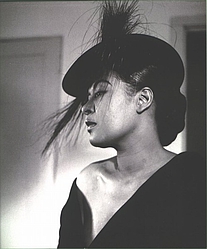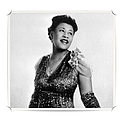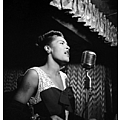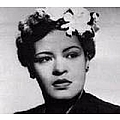Billie Holiday (Tricky Remix) Biography
Billie Holiday (Eleanora Fagan Gough, Philadelphia, PA, April 7, 1915 – New York City, NY, July 17, 1959) was an American jazz singer and songwriter. Nicknamed Lady Day by her loyal friend and musical partner Lester Young, Holiday was a seminal influence on jazz and pop singing. Her vocal style, strongly inspired by jazz instrumentalists, pioneered a new way of manipulating phrasing and tempo. Above all, she was admired for her deeply personal and intimate approach to singing. Critic John Bush wrote that she "changed the art of American pop vocals forever." She co-wrote only a few songs, but several of them have become jazz standards, notably "God Bless the Child," "Don't Explain," and "Lady Sings The Blues." She also became famous for singing jazz standards written by others, including "Easy Living" and "Strange Fruit." Billie Holiday had a difficult childhood, which greatly affected her life and career. Not much is known about the true details of her early life, though stories of it appeared in her autobiography, Lady Sings the Blues, first published in 1956 and later revealed to contain many inaccuracies. Her professional pseudonym was taken from Billie Dove, an actress she admired, and Clarence Holiday, her probable father. At the outset of her career, she spelled her last name "Halliday", presumably to distance herself from her neglectful father, but eventually changed it back to "Holiday". There is some controversy regarding Holiday's paternity, stemming from a copy of her birth certificate in the Baltimore archives that lists the father as a "Frank DeViese". Some historians consider this an anomaly, probably inserted by a hospital or government worker. Thrown out of her parents' home in Baltimore after becoming pregnant at thirteen, Billie's mother, Sadie Fagan, moved to Philadelphia where Billie was born. Mother and child eventually settled in a poor section of Baltimore. Her parents married when she was three, but they soon divorced, leaving her to be raised largely by her mother and other relatives. At the age of 10, she reported that she had been raped. That claim, combined with her frequent truancy, resulted in her being sent to The House of the Good Shepherd, a Catholic reform school, in 1925. It was only through the assistance of a family friend that she was released two years later. Scarred by these experiences, Holiday moved to New York City with her mother in 1928. In 1929 Holiday's mother discovered a neighbor, Wilbert Rich, in the act of raping her daughter; Rich was sentenced to three months in jail. According to Billie Holiday's own account, she was recruited by a brothel, worked as a prostitute in 1930, and was eventually imprisoned for a short time for solicitation. It was in Harlem, New York in the early 1930s that she started singing for tips in various night clubs. According to legend, penniless and facing eviction, she sang "Travelin All Alone" in a local club and reduced the audience to tears. She later worked at various clubs for tips, ultimately landing at Pod's and Jerry's, a well known Harlem jazz club. Her early work history is hard to verify, though accounts say she was working at a club named Monette's in 1933 when she was discovered by talent scout John Hammond. Hammond arranged for Holiday to make her recording debut in November 1933 with Benny Goodman singing two songs: "Your Mother's Son-in-Law" and "Riffin' the Scotch." Goodman was also on hand in 1935, when she continued her recording career with a group led by pianist Teddy Wilson. Their first collaboration included "What A Little Moonlight Can Do" and "Miss Brown To You," which helped to establish Holiday as a major vocalist. She began recording under her own name a year later, producing a series of extraordinary performances with groups comprising the Swing Era's finest musicians. Wilson was signed to Brunswick Records by John Hammond for the purpose of recording current pop tunes in the new Swing style for the growing jukebox trade. They were given free rein to improvise the material. Holiday's amazing method of improvising the melody line to fit the emotion was revolutionary. (Wilson and Holiday took pedestrian pop tunes like "Twenty-Four Hours A Day" or "Yankee Doodle Never Went To Town" and turned them into jazz classics with their arrangements.) With few exceptions, the recordings she made with Wilson or under her own name during the 1930s and early 1940s are regarded as important parts of the jazz vocal library. Billie also wrote songs during the 1930s. Such songs include "Billie's Blues", "Tell Me More (And Then Some)", "Everything Happens For The Best", "Our Love Is Different", and "Long Gone Blues". Among the musicians who accompanied her frequently was tenor saxophonist Lester Young, who had been a boarder at her mother's house in 1934 and with whom she had a special rapport. "Well, I think you can hear that on some of the old records, you know. Some time I'd sit down and listen to 'em myself, and it sound like two of the same voices, if you don't be careful, you know, or the same mind, or something like that."[9] Young nicknamed her "Lady Day" and she, in turn, dubbed him "Prez." She did a three-month residency at Clark Monroe's Uptown House in New York in 1937. In the late 1930s, she also had brief stints as a big band vocalist with Count Basie (1937) and Artie Shaw (1938). The latter association placed her among the first black women to work with a white orchestra, an arrangement that went against the tenor of the times. Holiday was recording for Columbia in the late 1930s when she was introduced to "Strange Fruit", a song based on a poem about lynching written by Abel Meeropol, a Jewish schoolteacher from the Bronx. Meeropol used the pseudonym "Lewis Allan" for the poem, which was set to music and performed at teachers' union meetings. It was eventually heard by Barney Josephson, proprietor of Café Society, an integrated nightclub in Greenwich Village, who introduced it to Holiday. She performed it at the club in 1939, with some trepidation, fearing possible retaliation. Holiday later said that the imagery in "Strange Fruit" reminded her of her father's death, and that this played a role in her resistance to performing it. In a 1958 interview, she also bemoaned the fact that many people did not grasp the song's message: "They'll ask me to 'sing that sexy song about the people swinging'", she said. When Holiday's producers at Columbia found the subject matter too sensitive, Milt Gabler agreed to record it for his Commodore Records. That was done in April, 1939 and "Strange Fruit" remained in her repertoire for twenty years. She later recorded it again for Verve. While the Commodore release did not get airplay, the controversial song sold well, though Gabler attributed that mostly to the record's other side, "Fine and Mellow", which was a jukebox hit. In addition to owning Commodore Records, Milt Gabler was an A&R man for Decca Records, and he signed Holiday to the label in 1944. Her first recording for Decca, "Lover Man", was a song written especially for her by Jimmy Davis, Roger "Ram" Ramirez, and Jimmy Sherman. Although its lyrics describe a woman who has never known love ("I long to try something I never had"), its theme—a woman longing for a missing lover—and its refrain, "Lover man, oh, where can you be?", struck a chord in wartime America and the record became one of her biggest hits. Holiday continued to record for Decca until 1950, including sessions with the Duke Ellington and Count Basie orchestras, and two duets with Louis Armstrong. Holiday's Decca recordings featured big bands and, sometimes, strings, contrasting her intimate small group Columbia accompaniments. Some of the songs from her Decca repertoire became signatures, including "Don't Explain" and "Good Morning Heartache". Holiday made one major film appearance, opposite Louis Armstrong in New Orleans (1947). The musical drama featured Holiday singing with Armstrong and his band and was directed by Arthur Lubin. Holiday was not pleased that her role was that of a maid, as she recalled in her autobiography, Lady Sings the Blues: "I thought I was going to play myself in it. I thought I was going to be Billie Holiday doing a couple of songs in a nightclub setting and that would be that. I should have known better. When I saw the script, I did. You just tell one Negro girl who's made movies who didn't play a maid or a whore. I don't know any. I found out I was going to do a little singing, but I was still playing the part of a maid." On May 16, 1947, Holiday was arrested for the possession of narcotics and drugs in her New York apartment. On May 27, 1947, she was in court. "It was called 'The United States of America versus Billie Holiday'. And that's just the way it felt," Holiday recalled in her autobiography, Lady Sings the Blues. Holiday pleaded guilty and was sentenced to Alderson Federal Prison Camp in West Virginia. Holiday said she never "sang a note" at Alderson even though people wanted her to. Luckily for Holiday, she was released early (March 16, 1948) due to good behavior. When she arrived at Newark, everybody was there to welcome her back, including her pianist Bobby Tucker. "I might just as well have wheeled into Penn Station and had a quiet little get-together with the Associated Press, United Press, and International News Service." Ed Fishman (who fought with Joe Glaser to be Holiday's manager) thought of the idea to throw a comeback concert at Carnegie Hall. Holiday hesitated at the idea because she thought that nobody would accept her back, but she decided to go with the idea. On March 27, 1948, the Carnegie concert was a success. Everything was sold out before the concert started. It isn't certain how many sets Holiday did. She did sing Cole Porter's "Night and Day" and "Strange Fruit". The concert was not recorded. Although childless, Billie Holiday had two godchildren: singer Billie Lorraine Feather, daughter of Leonard Feather, and Bevan Dufty, son of William Dufty. Holiday stated that she began using hard drugs in the early 1940s. She married trombonist Jimmy Monroe on August 25, 1941. While still married to Monroe, she became romantically involved with trumpeter Joe Guy, her drug dealer, eventually becoming his common law wife. She finally divorced Monroe in 1947, and also split with Guy. Because of her 1947 conviction, her New York City Cabaret Card was revoked which kept her from working in clubs there for the remaining 12 years of her life, except when she played at the Ebony Club in 1948, where she opened under the permission of John Levy. By the 1950s, Holiday's drug abuse, drinking, and relations with abusive men led to deteriorating health. As evidenced by her later recordings, Holiday's voice coarsened and did not project the vibrance it once had. However, she retained — and, perhaps, strengthened — the emotional impact of her delivery (See below). On March 28, 1952, Holiday married Louis McKay, a Mafia enforcer. McKay, like most of the men in her life, was abusive, but he did try to get her off drugs. They were separated at the time of her death, but McKay had plans to start a chain of Billie Holiday vocal studios, a la Arthur Murray dance schools. Her late recordings on Verve constitute about a third of her commercial recorded legacy and are as well remembered as her earlier work for the Columbia, Commodore and Decca labels. In later years her voice became more fragile, but it never lost the edge that had always made it so distinctive. On November 10, 1956, she performed before a packed audience at Carnegie Hall, a major accomplishment for any artist, especially a black artist of the segregated period of American history. Her performance of "Fine And Mellow" on CBS's The Sound of Jazz program is memorable for her interplay with her long-time friend Lester Young; both were less than two years from death. (see the clip here) Holiday first toured Europe in 1954, as part of a Leonard Feather package that also included Buddy DeFranco and Red Norvo. When she returned, almost five years later, she made one of her last television appearances for Granada's "Chelsea at Nine", in London. Her final studio recordings were made for MGM in 1959, with lush backing from Ray Ellis and his Orchestra, who had also accompanied her on Columbia's Lady in Satin album the previous year — see below). The MGM sessions were released posthumously on a self-titled album, later re-titled and re-released as Last Recordings. Holiday's autobiography, Lady Sings the Blues, was ghostwritten by William Dufty and published in 1956. Dufty, a New York Post writer and editor then married to Holiday's close friend Maely Dufty, wrote the book quickly from a series of conversations with the singer in the Duftys' 93rd Street apartment, drawing on the work of earlier interviewers as well. His aim was to let Holiday tell her story her way. On May 31, 1959, she was taken to Metropolitan Hospital in New York suffering from liver and heart disease. Police officers were stationed at the door to her room. She was arrested for drug possession as she lay dying and her hospital room was raided by authorities.[12] Holiday remained under police guard at the hospital until she died from cirrhosis of the liver on July 17, 1959. In the final years of her life, she had been progressively swindled out of her earnings, and she died with $0.70 in the bank and $750 (a tabloid fee) on her person. Her distinct delivery made Billie Holiday's performances instantly recognizable throughout her career. Her voice lacked range and was somewhat thin, plus years of abuse eventually altered the texture of her voice and gave it a prepossessing fragility. Nonetheless, the emotion with which she imbued each song remained not only intact but also profound.[13]. Her last major recording, a 1958 album entitled Lady in Satin, features the backing of a 40-piece orchestra conducted and arranged by Ray Ellis, who said of the album in 1997: "I would say that the most emotional moment was her listening to the playback of "I'm a Fool to Want You." There were tears in her eyes ... After we finished the album I went into the control room and listened to all the takes. I must admit I was unhappy with her performance, but I was just listening musically instead of emotionally. It wasn't until I heard the final mix a few weeks later that I realized how great her performance really was". In 1972, Diana Ross portrayed her in the film Lady Sings the Blues, which is loosely based on the 1959 autobiography of the same name. The 1972 film earned Ross a nomination for the Academy Award for Best Actress. In 1987, Billie Holiday was posthumously awarded the Grammy Lifetime Achievement Award. In 1994, the United States Postal Service introduced a Billie Holiday postage stamp, she ranked #6 on VH1's 100 Greatest Women in Rock n' Roll in 1999, and she was inducted into the Rock and Roll Hall of Fame in 2000. Over the years, there have been many tributes to Billie Holiday, including "The Day Lady Died", a 1959 poem by Frank O'Hara, and "Angel of Harlem", a 1988 release by the group U2. Songs composed by Holiday "Billie's Blues" (1936) "Don't Explain" (1944) "Everything Happens For The Best" (1939) "Fine and Mellow" (1939) "God Bless the Child" (1941) "Lady Sings the Blues" (1956) "Long Gone Blues" (1939) "Now or Never" (1949) "Our Love Is Different" (1939) "Stormy Blues" (1954) Discography Holiday recorded extensively for four labels: Columbia Records, issued on its subsidiary labels Brunswick Records, Vocalion Records, and OKeh Records, from 1933 through 1942, and the label proper in 1958; Commodore Records in 1939 and 1944; Decca Records from 1944 through 1950; and Verve Records, also on its earlier imprint Clef Records, from 1952 through 1958. Many of Holiday's recordings appeared on 78 rpm records prior to the long-playing vinyl record era, and only Clef, Verve, and Columbia issued Holiday albums in the 1950s during her lifetime that were not compilations of previously released material. Many compilations have been issued since her death; comprehensive box sets and a selection of live recordings are listed below. Grammy Hall of Fame Billie Holiday was posthumously inducted into the Grammy Hall of Fame, which is a special Grammy award established in 1973 to honor recordings that are at least twenty-five years old, and that have "qualitative or historical significance." Billie Holiday: Grammy Hall of Fame Awards Year Recorded Title Genre Label Year Inducted Notes 1944 "Embraceable You" Jazz (single) Commodore 2005 1958 Lady in Satin Jazz (album) Columbia 2000 1945 "Lover Man (Oh, Where Can You Be?)" Jazz (single) Decca 1989 1939 "Strange Fruit" Jazz (single) Commodore 1978 Listed also in the National Recording Registry by the Library of Congress in 2002 1941 "God Bless the Child" Jazz (single) Okeh 1976 Grammy Best Historical Album The Grammy Award for Best Historical Album has been presented since 1979. 2002 Lady Day: The Complete Billie Holiday Columbia 1933-1944 Winner 1994 The Complete Billie Holiday Verve 1945-1959 Winner 1992 Billie Holiday — The Complete Decca Recordings Verve 1944-1950 Winner 1980 Billie Holiday — Giants of Jazz Time-Life Winner
Billie Holiday (Tricky Remix) Lyrics
| Title | |
|---|---|
| 1 | Strange Fruit lyrics |
Write a comment
What do you think about Billie Holiday (Tricky Remix)? Let us know in the comments below!
Billie Holiday (Tricky Remix) Albums
| Title | Release | ||
|---|---|---|---|
| 1 | Verve Remixed |
Similar artists
- Ella FitzgeraldBlues/Jazz
- Billie HolidayBlues/Jazz
- Nina SimoneBlues/Jazz/Soul
- Bessie SmithBlues/Jazz
- Sarah VaughanBlues/Jazz
- Chet BakerBlues/Jazz
- Dinah WashingtonBlues/Jazz
- Anita O'DayJazz
- Duke EllingtonBlues/Jazz











